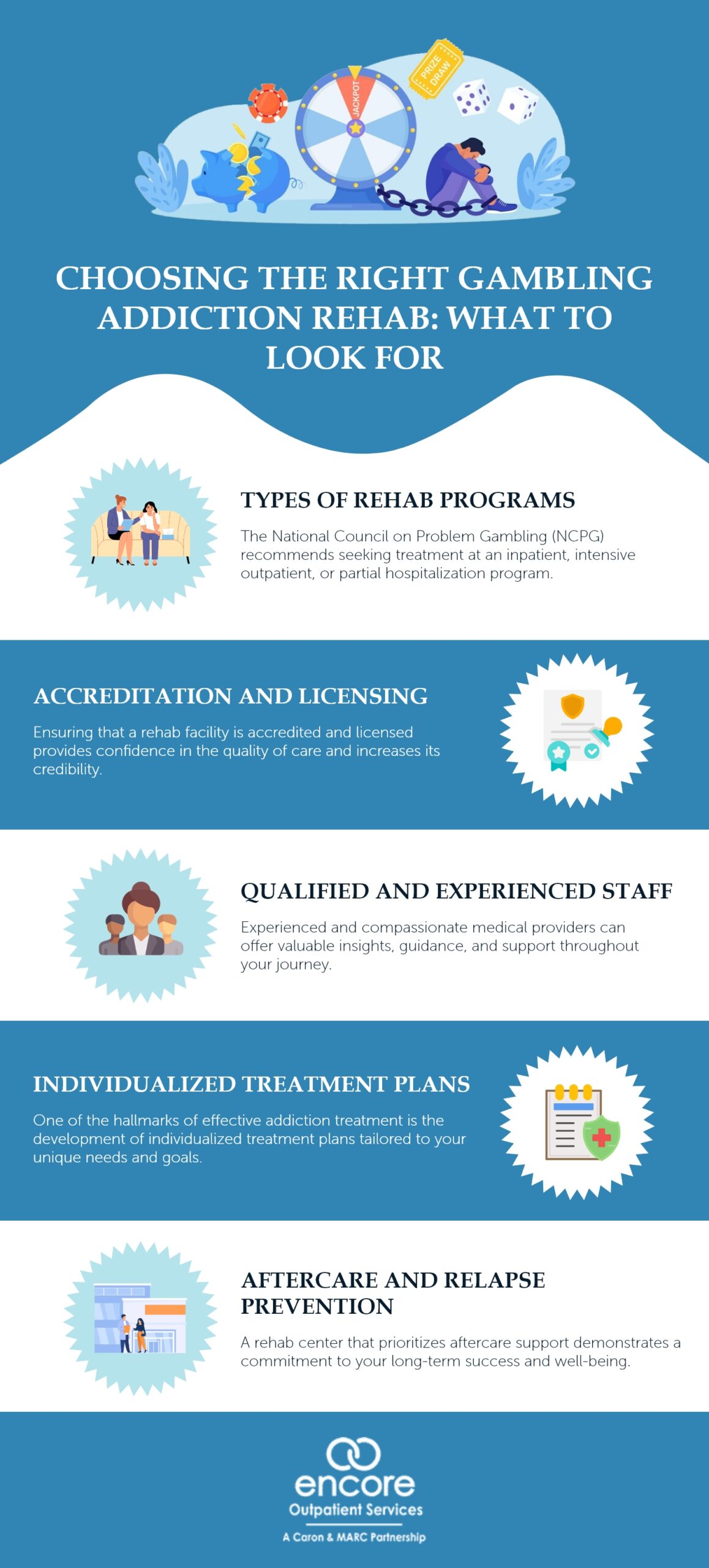Our dedication lies not just in treating symptoms but in addressing the root causes, offering a holistic approach that integrates the best of therapeutic practices with the warmth of community support.
Choosing the Right Gambling Addiction Rehab: What to Look For

Choosing the right treatment center for gambling addiction is a critical step in your wellness journey. With numerous options available, it’s essential to know what to look for to ensure the best possible care and support. Let us guide you through the key factors to consider when selecting a rehab facility. So you can make an informed decision for yourself or a loved one.
Types of Rehab Programs
Choosing the right treatment setting is the first step. Here are the primary types of rehab programs to consider:
- Inpatient Programs: Inpatient rehab involves residing at a treatment facility full-time. They provide a structured environment with 24/7 support. This option is ideal if you require intensive care or have a severe gambling addiction.
- Partial Hospitalization Programs (PHP): PHPs provide intensive treatment similar to inpatient programs but without an overnight stay. You attend treatment sessions during the day and return home in the evenings. This option is suitable for those who need significant support but prefer to stay at home.
- Intensive Outpatient Programs (IOP): IOPs are a middle ground between inpatient and outpatient care. They offer more intensive treatment than standard outpatient programs, with 3-5 therapy sessions per week tailored to your schedule. You get to maintain your professional or academic schedules while in treatment.
- Standard Outpatient Programs: Outpatient treatment facilities allow you to live at home while attending treatment sessions during the day. This option is suitable if you have a strong support system or as a step-down from an IOP program.
The National Council on Problem Gambling (NCPG) recommends seeking treatment at an inpatient, intensive outpatient, or partial hospitalization program. These types of settings provide a structured environment away from gambling triggers, allowing you to focus solely on your treatment.
Accreditation and Licensing
When researching gambling addiction treatment centers, one of the first things to look for is accreditation and licensing. Accredited facilities have met specific standards set by recognized organizations, ensuring a high level of care and professionalism.
- Accreditation: Look for facilities accredited by reputable organizations such as the Commission on Accreditation of Rehabilitation Facilities (CARF) or the Joint Commission. Accreditation ensures that the facility adheres to rigorous standards of care and continually strives for improvement.
- Licensing: Verify that the rehab facility is licensed by the state in which it operates. Licensing indicates that the facility meets state-specific regulations and standards for providing treatment services.
- Verification: Check the facility’s accreditation and licensing status on official websites or request documentation directly from the rehab center. This step ensures transparency and trustworthiness.
Ensuring that a rehab facility is accredited and licensed provides confidence in the quality of care and increases its credibility. They are also more likely to offer evidence-based therapies and adhere to ethical guidelines in their practices.
By choosing a reputable and accredited facility, you can feel assured that you or your loved one receives high-quality care.

Qualified and Experienced Staff
The quality of care provided at a rehab facility is highly dependent on the expertise and experience of its staff members. Experienced and compassionate medical providers can offer valuable insights, guidance, and support throughout your journey.
Key considerations include:
- Credentials: Ensure that the facility employs licensed and certified professionals who specialize in addiction treatment.
- Experience: Look for staff members with extensive experience in treating gambling disorders. Experienced professionals are more likely to understand the complexities of the disorder and provide effective, tailored treatment plans.
- Multidisciplinary Team: A multidisciplinary team with diverse backgrounds and specialties can provide a comprehensive and integrated approach to addiction treatment.
- Staff-to-Client Ratio: Inquire about the staff-to-client ratio to ensure that you will receive individualized attention and personalized care.
- Continuing Education: Prioritize rehab centers that invest in ongoing training and professional development for their staff to ensure the delivery of high-quality care.
By selecting a facility with experienced and dedicated staff members, you can feel confident in the level of care and support provided.
Individualized Treatment Plans
One of the hallmarks of effective addiction treatment is the development of individualized treatment plans tailored to your unique needs and goals.
- Personal Assessments: Treatment should begin with a comprehensive assessment to understand your specific needs. This includes your gambling history, family history, financial situation, and co-occurring disorders.
- Tailored Interventions: Based on the assessment, a customized treatment plan will be developed. This plan may incorporate various therapeutic approaches like individual therapy, group therapy, family therapy, and financial counseling.
- Flexibility: The treatment plan should be flexible and adaptable to your changing needs, ensuring that the approach remains relevant and effective throughout the process.
- Holistic Approach: An individualized plan should address all aspects of your life, including physical health, mental well-being, and social relationships. It should address the whole person, not just the addiction.
- Ongoing Evaluation: The treatment plan should be regularly reviewed and adjusted as needed based on regular assessments and feedback from your treatment team.
Before enrolling in a treatment program, inquire about the facility’s approach to developing individualized treatment plans and how they involve clients in the treatment planning process.
A rehab center that values personalized care and your personal input is more likely to provide a supportive and empowering treatment experience.
Therapeutic Approaches
When choosing a gambling addiction treatment center, it’s essential to consider the therapeutic approaches used in treatment. Different rehab centers utilize various therapeutic modalities to address gambling addiction and co-occurring mental health disorders.
Common therapeutic approaches in addiction treatment include:
- Cognitive-Behavioral Therapy (CBT): CBT helps you identify and change negative thought patterns and behaviors related to problematic gambling. It focuses on developing coping strategies and problem-solving skills to manage triggers and prevent relapse.
- Motivational Interviewing: This approach enhances your motivation to change by exploring and resolving ambivalence about quitting gambling habits. It encourages self-efficacy and commitment to the treatment process.
- Family Therapy: Involves family members in the treatment process to address relational dynamics and improve communication. It helps rebuild trust and provides a supportive environment for those involved.
- Group Therapy: A supportive community where you can share experiences, gain insights, and receive encouragement from peers facing similar challenges. It fosters a sense of belonging and accountability.
- Support Groups: Support groups like Gamblers Anonymous (GA) and Gam-Anon are an integral part of the treatment process for gambling addiction.
- Mindfulness and Stress Management: Techniques such as mindfulness meditation, yoga, and relaxation exercises help individuals manage stress and reduce gambling urges.
- Pharmacotherapy: In some cases, medications may be prescribed to address co-occurring mental health conditions, such as depression, anxiety, or substance use disorders, that are contributing to your gambling behavior.
- Holistic Therapies: Incorporating holistic approaches such as art therapy, music therapy, and nature-based therapy can enhance overall well-being and support emotional healing.
- Financial Counseling: By addressing the financial consequences of gambling and providing strategies to manage debt and financial losses, you can develop healthier financial habits and reduce the likelihood of relapse.
It’s important to choose a rehab center that offers a range of evidence-based therapies tailored to your specific needs. By selecting a facility that offers a diverse range of therapeutic approaches, you can receive comprehensive and personalized care to address the root causes of your gambling disorder.
Support Services
When choosing a gambling addiction rehab center, it’s essential to consider its support services. Key support services include:
- Support Groups: Regular participation in support groups such as Gamblers Anonymous provides ongoing peer support, encouragement, and accountability, which are essential for maintaining recovery.
- Family Support Programs: These programs provide education, emotional support, and practical guidance to help family members cope, set boundaries, and support their loved one’s wellness journey.
- Educational Workshops: Workshops and seminars offer education on gambling addiction, coping strategies, and relapse prevention, empowering you with the knowledge you need to reach your treatment goals.
- Case Management: Personalized case management services help you navigate your treatment journey, coordinate care, and access additional resources as needed.
- Crisis Intervention: This service provides immediate support during acute distress or relapse.
These support services complement formal treatment and improve your treatment outcome.
Aftercare and Relapse Prevention
Recovery from gambling addiction is a lifelong journey that requires ongoing support and resources beyond the initial treatment phase. When evaluating rehab programs, it’s important to consider the availability of aftercare support and relapse prevention services.
Look for gambling addiction rehab centers that offer:
- Different Levels of Care: A facility that offers various levels of care at one location and with one dedicated treatment team. This makes your treatment process and your transition from different care levels a lot smoother.
- Alumni Programs: Alumni programs play a crucial role in helping you maintain the progress made during formal treatment and prevent relapse over the long term. The sense of community, accountability, and continued growth fostered by these programs is invaluable.
- Relapse Prevention Plans: Developing a personalized relapse prevention plan helps you identify triggers, create strategies to avoid them, and outline steps to take if you experience a relapse.
- Follow-Up Appointments: Scheduled follow-up appointments with therapists ensure that progress is monitored and any emerging issues are addressed promptly.
A rehab center that prioritizes aftercare support demonstrates a commitment to your long-term success and well-being.
Facility Environment
The environment and atmosphere of a rehab facility can significantly impact your treatment experience and overall well-being. When choosing a rehab center, consider the facility’s setting, amenities, accommodations, and overall vibe.
- Comfortable Accommodations: If you choose an inpatient facility, make sure they provide clean, comfortable, and private accommodations to ensure a restful and stress-free stay.
- Supportive Atmosphere: The facility’s design and layout should foster a sense of safety, privacy, and community among all involved,
- Outdoor Spaces: Facilities with access to natural or serene surroundings are conducive to reflection and self-discovery.
- Recreational Areas: The availability of recreational areas, such as fitness centers, art rooms, or common lounges, provides opportunities for healthy activities and social interaction.
- Therapeutic Spaces: Dedicated spaces for therapy sessions, group meetings, and holistic activities like yoga or meditation ensure a conducive environment for treatment.
- Clean and Hygienic: Maintaining high standards of cleanliness and hygiene is essential for the overall health and well-being of participants.
The facility environment plays a significant role in creating a conducive space for healing and personal growth.
Cost and Insurance Coverage
Cost is a significant consideration when choosing a gambling addiction program, as it can impact your ability to access quality care and commit to treatment.
- Treatment Costs: The cost of rehab can vary widely depending on the type of program (inpatient, outpatient, or intensive outpatient), the duration of treatment, and the amenities offered. It’s important to get a clear breakdown of all expenses involved.
- Insurance Coverage: Many insurance plans provide coverage for addiction treatment, including gambling addiction. Verify with the rehab facility whether they accept your insurance and understand what services are covered under your plan.
- In-Network vs. Out-of-Network: Verify whether the rehab center is in-network with your insurance provider. In-network facilities typically offer more cost-effective options.
- Financial Assistance: Some rehab facilities offer sliding scale fees based on income, payment plans, or financial assistance programs to help make treatment more affordable.
- Hidden Costs: Be aware of any additional costs that might not be included in the initial estimate, such as medications, additional therapy sessions, or aftercare services.
- Pre-Authorization: Get pre-authorization from your insurance provider, if required, to avoid unexpected out-of-pocket expenses.
When exploring treatment for gambling addiction, consider the cost in relation to the quality of care and services provided. While cost is an important factor, prioritize selecting a rehab center that offers high-quality and evidence-based therapies to support your wellness journey.
Success Rates and Reviews
It’s helpful to research the facility’s success rates and client testimonials to gauge the effectiveness of their treatment approach.
- Success Rates: Look for rehab centers that transparently share their success rates and outcomes data, demonstrating their commitment to accountability and quality care.
- Client Testimonials: Read reviews and testimonials from former clients to gain perspective on the facility’s strengths, weaknesses, and overall treatment experience.
- Online Reviews: These reviews can provide a broader perspective on the facility’s reputation and service quality.
- Accreditation and Awards: Facilities with industry accreditations or awards often adhere to higher standards of care, which can be reflected in their success rates.
Choosing a rehab center with a proven track record of success and positive client feedback can increase your confidence in the treatment program’s efficacy.
Choosing the right gambling treatment center is a crucial decision that can set the stage for your wellness journey. By considering the above-mentioned factors, you can make an informed choice that aligns with your needs and goals.
Remember, seeking help is a courageous step toward healing and transformation. That’s why Encore Outpatient Services is here to help you every step of the way.
We offer comprehensive and personalized treatment programs, including partial hospitalization, intensive outpatient, and general outpatient care. Our dedicated team provides evidence-based therapies and continuous support to help you achieve lasting change. Seize the opportunity and embrace the transformation that awaits you with Encore Outpatient Services.
Let Us Support You On Your Recovery Journey!
Copyright 2025 Encore Outpatient Services | All Rights Reserved



